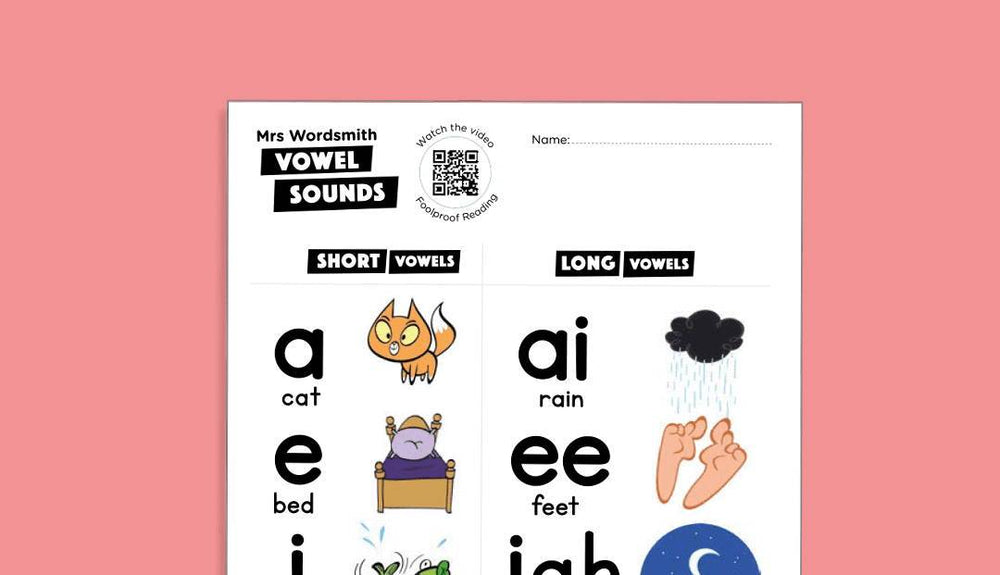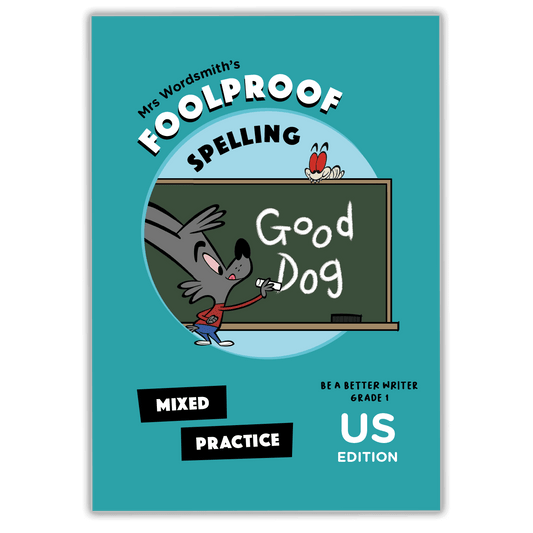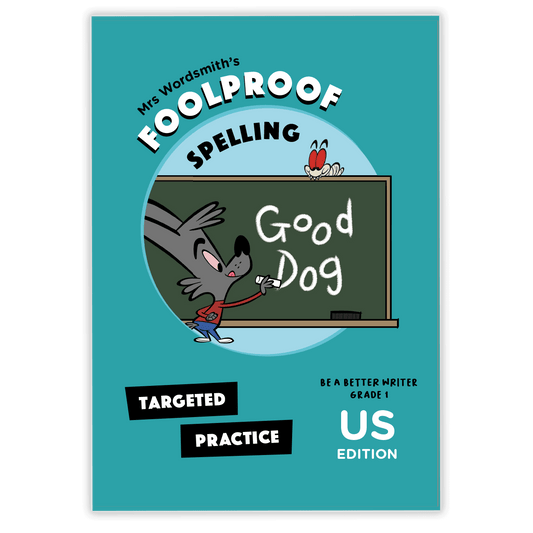You have been redirected to United States
Would you like to shop the US store?
Cart

You're Cart is empty!
You might also like:
















What's RCV? Rapidly Consuming Vegetables? Rainbow-Colored Velociraptors? Really Cool Vocabulary? That last one's almost there – it's Reading Comprehension Vocabulary! Including 500 essential vocabulary words split into 50 printable activity packs, this workbook was developed with assessment experts to help you ace exams. For ages 10-15 Word Tag® Combines Game-Based Learning and Fun Into One Outrageously Effective App Rated 4.8 stars on the app store, Get the app that’s 100% fun, 100% learning, 100% GAME! Watch as your kids play their way to improved vocabulary test scores Word Tag is an engaging educational app designed to improve children's vocabulary through exciting mini-games, enhancing their reading and comprehension skills. The game, endorsed by literacy experts and grounded in scientific research, utilises spaced repetition to effectively teach new words, with each game reinforcing the learning process. Players can learn up to 1,460 words annually with just 20 minutes of daily play, reflected in personal progress reports showcasing their learning journey from synonyms to contextual word usage. The app combines fun gameplay with educational content, tailored to support various needs, including creative writing, literature, exam preparation, and STEAM vocabulary. Note: 3 months of Word Tag Video Game is a non-cumulative promotion limited to one per customer.



Unlock your potential with this 192-page English workbook. Become the first six-year-old to write a novel, publish an academic article, or host a Ted Talk on "The Importance of Conjunctions". This First Grade workbook covers phonics, vocabulary, grammar, high-frequency words, handwriting, and more! This is not your average English workbook. Become the next child prodigy.Ages 6-7We make phonics fun! Readiculous teaches kids to read with the science of reading in just 10 minutes a day.The game, endorsed by literacy experts and grounded in scientific research, is designed to engage kids to learn to read through exciting mini-games. Readiculous engages kids to learn the sounds that go with each letter/spelling in a logical progression. As with most new things, repetition is the key to success. This is where we come in, we make learning ridiculously fun (pun intended) by designing reading games for maximum entertainment and educational value. Players learn 2x faster than traditional methods with just 10 minutes of daily play, reflected in personal progress reports showcasing which sounds, letters, and words they’re working on. Readiculous combines fun gameplay with educational content, tailored to support various needs.Note: 3 months of Readiculous Video Game is a non-cumulative promotion limited to one per customer.


Unlock your potential with this 111-page, printable workbook. Become the first six-year-old to write a novel, publish an academic article, or host a Ted Talk on "The Importance of Conjunctions". These Grade 1 worksheets cover math, phonics, vocabulary, grammar, handwriting, and more! This is not your average English workbook. Become the next child prodigy.For ages 6-7



Everything you need to know for Second Grade English in one book. Become the first seven-year-old to write a best-selling cookbook, open a restaurant, and begin every recipe with a perfectly-crafted fronted adverbial. This book covers vocabulary, grammar, punctuation, spelling, reading comprehension, writing, handwriting, and more! This is not your average English workbook. Become the next child prodigy.Ages 7-8 Word Tag® Combines Game-Based Learning and Fun Into One Outrageously Effective App Rated 4.8 stars on the app store, Get the app that’s 100% fun, 100% learning, 100% GAME! Watch as your kids play their way to improved vocabulary test scores Word Tag is an engaging educational app designed to improve children's vocabulary through exciting mini-games, enhancing their reading and comprehension skills. The game, endorsed by literacy experts and grounded in scientific research, utilises spaced repetition to effectively teach new words, with each game reinforcing the learning process. Players can learn up to 1,460 words annually with just 20 minutes of daily play, reflected in personal progress reports showcasing their learning journey from synonyms to contextual word usage. The app combines fun gameplay with educational content, tailored to support various needs, including creative writing, literature, exam preparation, and STEAM vocabulary. Note: 3 months of Word Tag Video Game is a non-cumulative promotion limited to one per customer.


Sity or city? Knee or nee? Purple or purpel? Deepen your spelling knowledge with these printable mixed practice papers, reviewing everything you learned in Spelling Targeted Practice Grade 2. It's the perfect way to reinforce a year's worth of curriculum and make sure you know the difference between a good night's sleep and a good knight's sleep.For ages 7-8 Word Tag® Combines Game-Based Learning and Fun Into One Outrageously Effective App Rated 4.8 stars on the app store, Get the app that’s 100% fun, 100% learning, 100% GAME! Watch as your kids play their way to improved vocabulary test scores Word Tag is an engaging educational app designed to improve children's vocabulary through exciting mini-games, enhancing their reading and comprehension skills. The game, endorsed by literacy experts and grounded in scientific research, utilises spaced repetition to effectively teach new words, with each game reinforcing the learning process. Players can learn up to 1,460 words annually with just 20 minutes of daily play, reflected in personal progress reports showcasing their learning journey from synonyms to contextual word usage. The app combines fun gameplay with educational content, tailored to support various needs, including creative writing, literature, exam preparation, and STEAM vocabulary. Note: 3 months of Word Tag Video Game is a non-cumulative promotion limited to one per customer.



Most snakes think they can only say words beginning with "s", like ssssoup, ssssalad, or ssssalmonella. But this printable workbook proves otherwise. Did you know "c" can sometimes make an "s" sound too? Like city, cinema, or circle!Divided into bite-sized packets and packed with engaging character illustrations, these targeted practice papers help boost retention. They cover all the essential spelling patterns needed for Grade 2 or to boost a snake's confidence. For ages 7-8 Word Tag® Combines Game-Based Learning and Fun Into One Outrageously Effective App Rated 4.8 stars on the app store, Get the app that’s 100% fun, 100% learning, 100% GAME! Watch as your kids play their way to improved vocabulary test scores Word Tag is an engaging educational app designed to improve children's vocabulary through exciting mini-games, enhancing their reading and comprehension skills. The game, endorsed by literacy experts and grounded in scientific research, utilises spaced repetition to effectively teach new words, with each game reinforcing the learning process. Players can learn up to 1,460 words annually with just 20 minutes of daily play, reflected in personal progress reports showcasing their learning journey from synonyms to contextual word usage. The app combines fun gameplay with educational content, tailored to support various needs, including creative writing, literature, exam preparation, and STEAM vocabulary. Note: 3 months of Word Tag Video Game is a non-cumulative promotion limited to one per customer.



Practice makes perfect when it comes to spotting the difference between an elephant and an elefant! Deepen your spelling knowledge with these printable mixed practice papers, reviewing everything you learned in Spelling Targeted Practice Grade 1. It's the perfect way to reinforce a year's worth of curriculum and make sure you know the difference between a giraffe and a jiraffe. For ages 6-7



Planning a trip to the zoo but have no idea where to start? Is that an elephant or an elefant? A jiraffe or a giraffe? This printable workbook is here to help!Divided into bite-sized packets and packed with engaging character illustrations, these worksheets were designed by learning experts to boost retention. They cover all the essential spelling patterns needed for Grade 1 and a safari. For ages 6-7



Unlock your potential with this 192-page English workbook. Become the first five-year-old to write a novel, start a blog, or host a Ted Talk on "Phonological & Phonemic Awareness". This kindergarten workbook covers letters and sounds, phonics, high-frequency words, vocabulary, handwriting, and more! This is not your average English workbook. Become the next child prodigy.Ages 5-6We make phonics fun! Readiculous teaches kids to read with the science of reading in just 10 minutes a day.The game, endorsed by literacy experts and grounded in scientific research, is designed to engage kids to learn to read through exciting mini-games. Readiculous engages kids to learn the sounds that go with each letter/spelling in a logical progression. As with most new things, repetition is the key to success. This is where we come in, we make learning ridiculously fun (pun intended) by designing reading games for maximum entertainment and educational value. Players learn 2x faster than traditional methods with just 10 minutes of daily play, reflected in personal progress reports showcasing which sounds, letters, and words they’re working on. Readiculous combines fun gameplay with educational content, tailored to support various needs.Note: 3 months of Readiculous Video Game is a non-cumulative promotion limited to one per customer.

Chat with Mrs Wordsmith
Hello, and welcome to Mrs Wordsmith support.
How can I help you today?
I can help you with:

Comment
Leave a comment